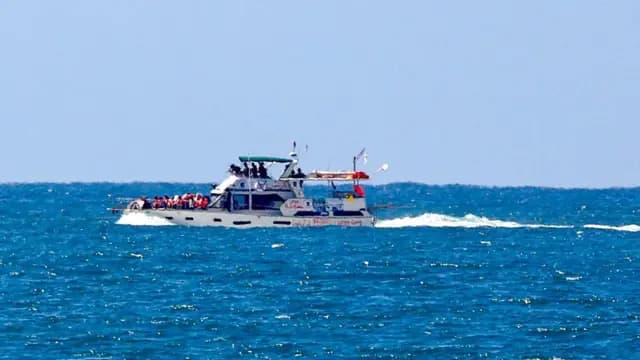We're loading the full news article for you. This includes the article content, images, author information, and related articles.
A new aid flotilla bound for Gaza was intercepted by the Israeli military in international waters on Wednesday, October 8, 2025 EAT, sparking renewed debate on international maritime law and humanitarian access to the besieged territory.

The Israeli military on Wednesday, October 8, 2025 EAT, intercepted a new aid flotilla attempting to reach Gaza, just days after a similar incident involving the Global Sumud Flotilla drew international condemnation. The Freedom Flotilla Coalition (FFC) reported on Instagram that the Israeli military was jamming signals and had boarded at least two of its vessels, approximately 220 km off the coast of Gaza. The FFC explicitly stated that the Israeli military lacks legal jurisdiction over international waters and that their flotilla posed no harm.
The Israeli Foreign Ministry confirmed the interception, characterising it as "another futile attempt to breach the legal naval blockade and enter a combat zone." The ministry further stated that those on board would be transferred to an Israeli port and subsequently deported. The intercepted vessels, identified as the Gaza Sunbirds, Alaa Al-Najjar, and Anas Al-Sharif, were reportedly attacked and boarded in the early morning hours. Another ship, the Conscience, was also reported to be "under attack."
This incident marks the second interception of an aid flotilla by Israel in recent days. Earlier, the Global Sumud Flotilla, comprising about 40 vessels and carrying over 450 activists, was also intercepted, with many activists detained. Israel has maintained a blockade on Gaza since Hamas took control in 2007, strictly controlling the entry of goods and aid. Previous attempts by aid flotillas to break this blockade have also been met with Israeli interception, notably the 2010 Mavi Marmara incident.
Kenya's stance on the Israel-Palestine conflict has evolved, with the government consistently backing Israel through diplomatic actions and votes at the UN, despite a clear divide in public opinion within the country. However, recent statements from Kenyan officials, including Ambassador Ekitila Lokaale at the UN General Assembly, have condemned humanitarian atrocities in the Middle East and called for a ceasefire, suggesting a potential shift towards a more balanced approach. Prime Cabinet Secretary Musalia Mudavadi affirmed in July 2025 that Kenya's support for a two-state solution is now enshrined in law through a 2025 sessional paper passed by Parliament.
The principle of freedom of navigation dictates that ships flying the flag of any sovereign state should not face interference from other states when in international waters, with exceptions outlined in international law. This right is codified in Article 87(1)a of the 1982 United Nations Convention on the Law of the Sea (UNCLOS), which states that the high seas are open to all states and includes freedom of navigation. The FFC argues that the Israeli military has no legal jurisdiction over international waters, a position supported by the general principles of UNCLOS.
However, the application of freedom of navigation in specific situations, particularly concerning blockades, remains a contentious issue. While UNCLOS upholds freedom of navigation on the high seas, it also defines different zones of sovereignty that limit the rules for foreign ships in these waters, such as internal waters and exclusive economic zones.
The Freedom Flotilla Coalition, an international network of pro-Palestinian activist groups, organises civilian maritime missions with the stated aim of delivering humanitarian aid and challenging Israel's blockade of Gaza. They assert that their flotillas carry vital aid, including medicines, respiratory equipment, and nutritional supplies, intended for hospitals in Gaza.
The Israeli government views these flotillas as attempts to breach a legitimate naval blockade and enter a combat zone. The interception and subsequent deportation of activists have consistently drawn criticism from international human rights organisations and pro-Palestinian groups, who argue that such actions impede humanitarian efforts and violate international law.
The exact number of activists detained in the latest interception remains unknown. While the Israeli Foreign Ministry confirmed that those on board would be deported, details regarding their current status and the timeline for their deportation have not been fully disclosed. The Israeli military has not yet issued a detailed statement regarding the incident, beyond the Foreign Ministry's confirmation.
The ongoing debate centers on the legality of Israel's naval blockade of Gaza under international law, particularly in relation to the right of innocent passage and freedom of navigation in international waters. Critics argue that blockades that prevent humanitarian aid from reaching a civilian population may violate international humanitarian law.
The interception on Wednesday, October 8, 2025 EAT, follows a previous interception of the Global Sumud Flotilla in recent days. The activists from both flotillas are expected to be deported. The Freedom Flotilla Coalition has indicated it will continue its efforts to challenge the blockade and deliver aid to Gaza.
Observers will be closely watching for further statements from the Israeli government and military, as well as reactions from international bodies and human rights organisations. The treatment of the detained activists and the speed of their deportation will likely be a point of international scrutiny. The broader implications for humanitarian access to Gaza and the ongoing debate surrounding the legality of the blockade are also key areas to monitor.
Previous reports on the Global Sumud Flotilla interception and the international response to Israel's blockade of Gaza provide additional context to this developing situation.
Keep the conversation in one place—threads here stay linked to the story and in the forums.
Sign in to start a discussion
Start a conversation about this story and keep it linked here.
Other hot threads
E-sports and Gaming Community in Kenya
Active 9 months ago
The Role of Technology in Modern Agriculture (AgriTech)
Active 9 months ago
Popular Recreational Activities Across Counties
Active 9 months ago
Investing in Youth Sports Development Programs
Active 9 months ago